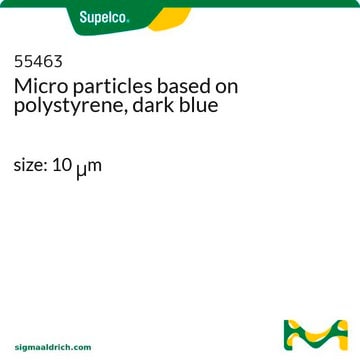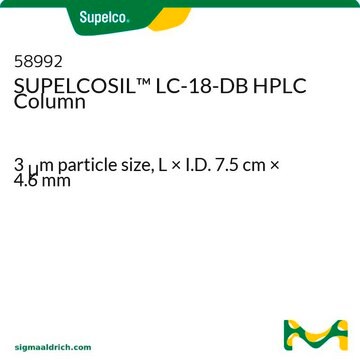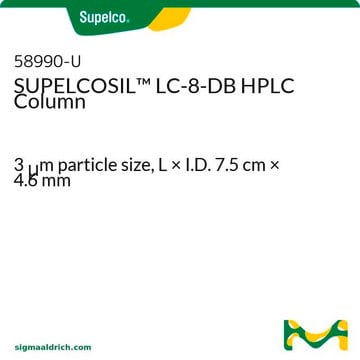58982
SUPELCOSIL™ LC-8 (3 µm) HPLC Columns
L × I.D. 7.5 cm × 4.6 mm, HPLC Column
Sign Into View Organizational & Contract Pricing
All Photos(1)
About This Item
UNSPSC Code:
41115700
eCl@ss:
32110501
Recommended Products
product name
SUPELCOSIL™ LC-8 HPLC Column, 3 μm particle size, L × I.D. 7.5 cm × 4.6 mm
Agency
suitable for USP L7
feature
endcapped
manufacturer/tradename
SUPELCOSIL™
extent of labeling
6.0% carbon loading
parameter
≤70 °C temp. range
400 bar pressure (5801 psi)
technique(s)
HPLC: suitable
L × I.D.
7.5 cm × 4.6 mm
surface area
170 m2/g
surface coverage
surface coverage 3.2 μmol/m2
matrix
silica gel, spherical particle platform
matrix active group
C8 (octyl) phase
particle size
3 μm
pore size
120 Å
pH range
2-7.5
application(s)
food and beverages
separation technique
reversed phase
Looking for similar products? Visit Product Comparison Guide
General description
A phase less hydrophobic than C18. Provides less retention of both polar and non-polar compounds than C18. Use a mobile phase containing 5% less organic modifier for the C8 column than C18. Polar compounds are, relatively, more strongly retained on C8 than C18 columns.
Legal Information
SUPELCOSIL is a trademark of Sigma-Aldrich Co. LLC
related product
Product No.
Description
Pricing
Choose from one of the most recent versions:
Already Own This Product?
Find documentation for the products that you have recently purchased in the Document Library.
Thomas Borch et al.
Journal of chromatography. A, 1022(1-2), 83-94 (2004-02-03)
Explosives such as 2,4,6-trinitrotoluene (TNT), octahydro-1,3,5,7-tetranitro-1,3,5,7-tetrazocine (HMX), and hexahydro-1,3,5-trinitro-1,3,5-triazine (RDX) are widely distributed environmental contaminants. Complete chromatographic separation is necessary in order to accurately determine and quantify explosives and their degradation products in environmental samples and in (bio)transformation studies. The
Jadwiga Piwowarska et al.
Journal of chromatography. B, Analytical technologies in the biomedical and life sciences, 805(1), 1-5 (2004-04-29)
A high-performance liquid chromatographic method is described for determination of lidocaine (2-(dietyloamino)-N-(2,6-dimetylofenylo) acetamid) and its metabolite, monoethylglycine xylidide (MEGX), in human serum containing various concentration of bilirubin. Lidocaine and its metabolite were extracted from human serum using dichloromethane. After separation
P K Kunicki
Journal of chromatography. B, Biomedical sciences and applications, 750(1), 41-49 (2001-02-24)
A HPLC-UV determination of clobazam and N-desmethylclobazam in human serum and urine is presented. After simple liquid-liquid extraction with dichloromethane the compounds and an internal standard diazepam were separated on a Supelcosil LC-8-DB column at ambient temperature under isocratic conditions
F Belal et al.
Journal of pharmaceutical and biomedical analysis, 24(3), 335-342 (2001-02-24)
A simple, rapid and sensitive HPLC method has been developed for the simultaneous determination of ramipril and hydrochlorothiazide in their dosage forms. Acetonitrile: sodium perchlorate solution (0.1 M) adjusted to pH 2.5+/-0.2 with phosphoric acid (46:54 v/v), was used as
M Molíková et al.
Journal of chromatography. A, 1217(8), 1305-1312 (2010-01-12)
The availability of ionic liquids (ILs) in wide areas of application often results in the requirement on their determination. The attention is also often focused on the knowledge of hydrophobicity as it plays a key role in the biological effects
Our team of scientists has experience in all areas of research including Life Science, Material Science, Chemical Synthesis, Chromatography, Analytical and many others.
Contact Technical Service







